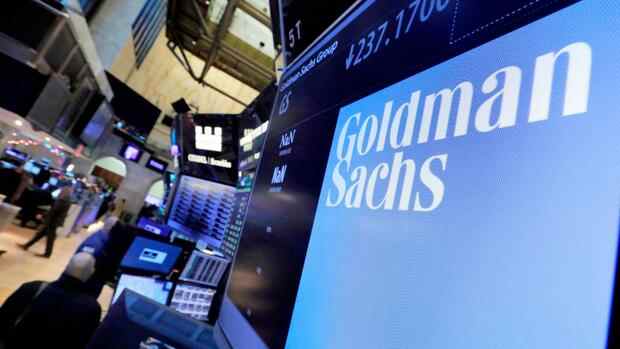new York The profit of the US investment bank Goldman Sachs fell significantly in the first quarter. Declining capital market activity after the record levels of the previous year weighed on business.
“It was a turbulent quarter dominated by the devastating invasion of Ukraine,” said David Solomon, head of America’s leading investment bank, in the quarterly report released on Thursday.
Earnings fell to $3.83 billion in the January-March period from $6.71 billion a year earlier. Earnings per share were $10.76, up from $18.60 a year earlier.
The bank’s net income fell by almost 27 percent to $12.93 billion in the first quarter of the year. Investment banking revenue even shrank by 36 percent to $2.41 billion.
Against the background of the Ukraine conflict, business with advice on IPOs, among other things, weakened. The consumer business and wealth management business fared significantly better. There, revenues increased by 21 percent to $ 2.10 billion
Wells Fargo makes a fifth less profit
The major US bank Wells Fargo also recorded a significant drop in profits at the start of the year. Business was weakened by very high inflation and rising interest rates, as well as concerns about the potential economic impact of the war in Ukraine.
Profits shrank in the first quarter within a year by more than a fifth to 3.67 billion dollars, as the San Francisco-based fourth-largest bank in the USA announced on Thursday. The institute made a profit of 88 cents per share after $1.02 per share certificate a year earlier. However, analysts had only expected an average of 80 cents per share.
US banks are under pressure because of the consequences of the Ukraine war.
(Photo: Reuters)
Internal indicators continued to point to the financial strength of customers, explained bank boss Charlie Scharf. However, the US Federal Reserve has made it clear that it will take the necessary steps to lower inflation. “And this will certainly reduce economic growth,” warned Scharf.
Inflation in the US climbed to 8.5 percent in March. In addition, there are further risks from the Ukraine war, said Scharf.
The bank’s total revenues fell 5 percent year-on-year to $17.59 billion in the January-March period. Analysts had expected $17.8 billion.
Morgan Stanley falters in investment banking
A similar picture at Morgan Stanley: There, too, profits fell in the first quarter. The Wall Street money house announced on Thursday that net profit fell to $3.5 billion (previous year: $3.98 billion) in the period from January to March.
Morgan Stanley earned $2.02 per share, down from $2.19 a year earlier. Bank chief James Gorman said the institution has done well despite a volatile market and economic uncertainties. The results exceeded the analysts’ forecasts and the share initially reacted with around two percent price increases before the market.
Earnings fell to $14.8 (15.7) billion in the quarter. In investment banking they shrank to around 7.7 (8.6) billion dollars. Last year, Morgan Stanley benefited from a veritable boom in mergers and acquisitions.
Profit also shrinks at JP Morgan
JP Morgan had already started with the quarterly figures on Wednesday. America’s largest bank reported a 42 percent slump in profit for the first quarter on a yearly basis and increased provisioning for the first time since the pandemic began to prepare for defaulting loans. The money house felt the high inflation, rising interest rates and the consequences of the Ukraine war in various ways.
>>Read also: Exit of the Capital Group triggers price slides at Deutsche Bank and Commerzbank
Investment banking came to a virtual standstill with the start of the war. The volume of announced and completed mergers and acquisitions fell to its lowest level since the beginning of the pandemic, according to data from the analysis house Refinitiv. Investment banking revenue fell 28 percent to $2.1 billion in the first quarter.
The granting of new mortgage loans fell by 37 percent in view of the significantly higher interest rates. Trading sales fell by three percent and, at $8.75 billion, were a good $1 billion higher than initially expected. JP Morgan announced a $30 billion buyback program.
Citigroup exceeds expectations and plans to reduce business in Russia
And the US financial group Citigroup also started the fiscal year with significantly less profit. In the first quarter, the surplus fell by around 46 percent year-on-year to $ 4.3 billion (4 billion euros), as the money house announced in New York on Thursday.
Total revenue fell just 2 percent to $19.2 billion. Overall, the quarterly figures exceeded expectations. Trading in securities in particular proved to be relatively stable during the stock market downturn.
However, Citi had to absorb almost $2 billion in balance sheet charges from Russia’s war of aggression against Ukraine. Unlike most other big US banks, the money house still has a strong business presence in Russia, which has become a problem due to the war and sanctions.
The institution is trying to reduce exposure, but is preparing for high loan default provisions. Bank boss Jane Frazer warned of increasing geopolitical and economic risks.
More: JP Morgan profit slumps in first quarter
